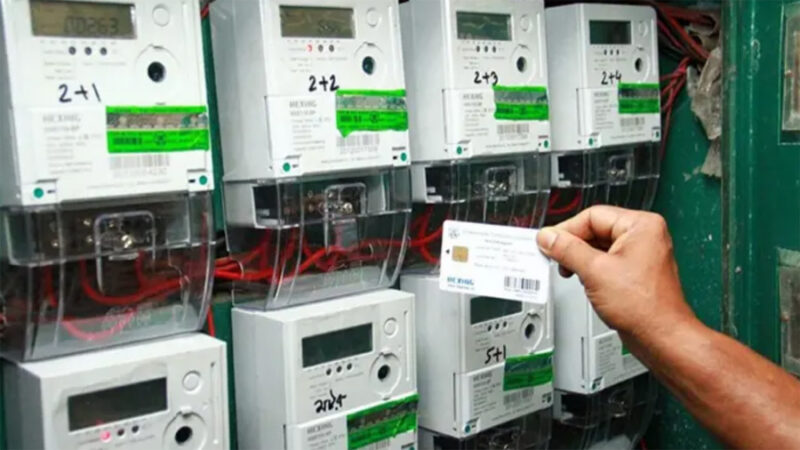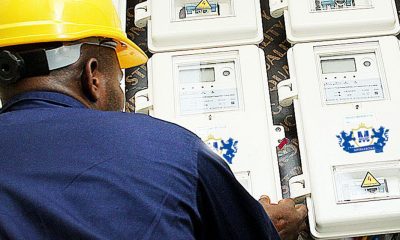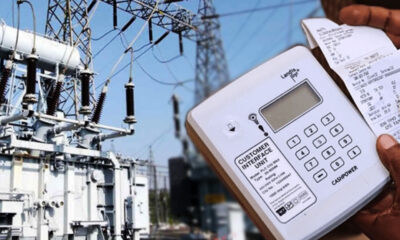Business
Electricity: DisCos increase prices of prepaid meters by 28.03%

Electricity: DisCos increase prices of prepaid meters by 28.03%
Electricity Distribution Companies, DisCos, have announced a rise in the price of various electricity meter models, making it the second price hike in four months.
According to the DisCos, the cost of a single-phase meter has risen from approximately N117,000 to as much as N149,800. This amount indicates an increase of 28.03 per cent or N32,800, depending on the distribution company and meter vendor.
The new prices posted on the official X handle of the Discos yesterday were scheduled to take effect on Tuesday, November 5, 2024. It also reflected the deregulation of meter asset providers as directed by the Nigerian Electricity Regulatory Commission, NERC.
It was learned that the upward revision followed an earlier increase in August 2024, further amplifying concerns among electricity consumers about affordability and accessibility.
An analysis of the documents revealed that meter prices vary across DisCos, influenced by vendors and meter models (single-phase and three-phase).
Eko DisCo pegged the price of its Single Phase Metre between N135,987.5 and N161,035, while a Three Phase Metre was pegged between N226,600 and N266,600.
Ibadan DisCo said customers will pay between a range of N130,998 and N142,548 for a single-phase meter and N226,556.25–NN232,008 for a three-phase meter.
Customers under Abuja DisCo will pay N123,130.53–NN147,812.5 for single-phase meters and N206,345.65–NN236,500 for three-phase meters.
READ ALSO:
- Naira exchanges for N1,720/$ in parallel market
- Israeli strikes kill at least 40 in east Lebanon – health ministry
- Rivers school sacks teacher on ‘husband’s request’
Kano Electricity Distribution said its customers will pay N127,925–N129,999 for a single-phase metre and N223,793–NN235,425 for a three-phase meter.
Kaduna DisCo said N131,150—N142,548.94 would be paid for single-phase meters and N220,375—N232,008.04 three-phase meters.
In April, the Nigerian Electricity Regulatory Commission introduced a significant policy shift by announcing the deregulation of meter prices under the Metre Asset Provider, MAP, scheme for end-user customers.
The move was targeted at addressing lingering issues surrounding meter supply and pricing transparency within the electricity sector.
According to NERC’s latest order, meter prices under the MAP scheme will now be determined through competitive bidding, rather than being centralised.
This shift is expected to foster greater competition among meter providers, ultimately improving cost efficiency and service delivery for end users.
The deregulation removes earlier operational restrictions, allowing MAP permit holders to provide metering services across all electricity distribution companies in Nigeria.
However, MAPs must meet specific regulatory requirements to ensure compliance and maintain quality standards in service delivery.
Recall that NERC regulated meter prices, which were often subsidised across all DisCos to reduce costs for customers. While this model aimed to make metering affordable, it inadvertently stifled competition and limited transparency in the supply chain.
As a result, DisCos and customers were unable to negotiate or explore better deals from meter vendors, contributing to inefficiencies in the system.
With deregulation now in place, NERC anticipates a more dynamic metering ecosystem where customers and DisCos can benefit from competitive pricing, improved service quality, and greater accountability among meter providers.
Electricity: DisCos increase prices of prepaid meters by 28.03%
Business
Dangote Refinery Slashes Petrol Price to ₦774, Ends PMS Bonus Window

Dangote Refinery Slashes Petrol Price to ₦774, Ends PMS Bonus Window
Dangote Petroleum Refinery and Petrochemicals FZE has announced a reduction in the gantry price of Premium Motor Spirit (PMS), commonly known as petrol, by ₦25 per litre, lowering the ex-depot rate from ₦799 to ₦774 per litre. The new pricing took immediate effect on Tuesday, 10 February 2026.
The refinery notified petroleum marketers through its Group Commercial Operations Department, stating:
“This is to notify you of a change in our PMS gantry price from ₦799 per litre to ₦774 per litre.”
Industry checks on platforms like petroleumprice.ng confirmed that the revised price has already been updated across petroleum pricing systems, ensuring transparency for downstream operators and consumers.
In the same notice, Dangote Refinery announced the end of its PMS lifting incentive programme, which had offered marketers bonuses for purchasing within specific volume thresholds. The refinery stated that credits for volumes loaded from 2 to 10 February 2026 would be posted to marketers’ accounts.
READ ALSO:
- El-Rufai: I Supported Tinubu Out of Party Principle, Not Friendship
- Trump Approves Deployment of 200 U.S. Soldiers to Support Nigeria’s Fight Against Terrorists
- Atiku Rejects Mixed Result Transmission
Analysts say the simultaneous price cut and closure of the bonus window signals a shift from volume-driven incentives to a more stable and predictable pricing framework, as the refinery consolidates its domestic market share.
The move comes amid continued volatility in PMS prices following the full deregulation of Nigeria’s downstream petroleum sector and the removal of fuel subsidies. In 2025, ex-depot prices fluctuated between ₦700 and over ₦800 per litre, driven by exchange rate pressures, global crude oil prices, and reliance on imported fuel, which in turn pushed pump prices higher nationwide.
With a production capacity of 650,000 barrels per day, Dangote Refinery — Africa’s largest single-train refinery — has become a key reference point for domestic fuel pricing. Its operations have helped moderate petrol prices, especially in southern and coastal distribution corridors, and reduce Nigeria’s dependence on imported fuel.
Industry observers note that the latest price reduction reflects easing production costs, improved operational efficiency, and increased competition from imported cargoes and modular refineries. As the refinery continues to expand, its pricing decisions are expected to influence national petrol rates, transportation costs, and inflationary pressures.
Dangote Refinery Slashes Petrol Price to ₦774, Ends PMS Bonus Window
Business
Fuel Self-Sufficiency: Dangote Refinery Counters Misinformation on Petrol Imports

Fuel Self-Sufficiency: Dangote Refinery Counters Misinformation on Petrol Imports
The Dangote Petroleum Refinery & Petrochemicals has clarified that there is no importation of finished Premium Motor Spirit (PMS) — commonly known as petrol — into Nigeria, countering recent reports suggesting otherwise. The company stated that locally refined petrol from the Dangote Refinery now meets a significant portion of Nigeria’s domestic demand, marking a major milestone in the country’s journey toward fuel self-sufficiency.
In a statement, the refinery dismissed claims that it imports finished PMS as false and misleading, stressing that such reports misrepresent its operations and could undermine public confidence in Nigeria’s local refining sector. The company also indicated that it has identified individuals behind these claims and warned that legal action may be pursued against parties spreading misinformation.
Oil marketers and industry observers confirm that the refinery has consistently supplied petrol to the Nigerian market, reducing reliance on imported fuel. The move has been welcomed by stakeholders, including the Independent Petroleum Marketers Association of Nigeria (IPMAN), which advised its members to prioritize purchasing petrol from Dangote’s facility to support domestic refining and strengthen local fuel supply chains.
READ ALSO:
- “Electoral Act Amendment: El-Rufai Calls Akpabio ‘Tinubu’s Lapdog’”
- Lookman Reflects on Bittersweet La Liga Debut as Atletico Madrid Fall at Home
- Fayose Claims Presidency Told Wike to Respect Fubara or Risk Losing Job
This announcement comes amid broader efforts to revamp Nigeria’s state-owned refineries. Talks are ongoing between the Nigerian National Petroleum Company (NNPC) and technical partners to enhance capacity at existing refineries, aiming to further reduce the country’s dependence on imported petroleum products.
Analysts say that the rise of local refining through Dangote’s facility is poised to have several benefits for Nigeria, including stabilizing fuel supply, saving foreign exchange, and potentially moderating fuel prices. As the refinery ramps up production, Nigerians can expect more reliable access to locally refined petrol, signaling a shift from historical dependency on imported fuel toward greater energy self-reliance.
The Dangote Refinery, now one of the largest in Africa, continues to deliver substantial volumes of petrol and other refined products across Nigeria, underlining its central role in the country’s energy infrastructure and the nation’s ambition to achieve self-sufficiency in petroleum products.
Fuel Self-Sufficiency: Dangote Refinery Counters Misinformation on Petrol Imports
Business
Naira Posts Strong Comeback, Breaking Two‑Year High Against Dollar

Naira Posts Strong Comeback, Breaking Two‑Year High Against Dollar
The Nigerian naira has staged a remarkable comeback against the U.S. dollar, defying expectations and posting sustained appreciation across foreign exchange markets as economic conditions improve, external reserves strengthen, and central bank interventions take effect. This upward momentum reflects a significant shift in Nigeria’s currency dynamics, offering potential relief for businesses, investors, and everyday consumers.
In the official foreign exchange market, the naira has recently strengthened to around ₦1,358 per dollar, its strongest level in nearly two years, fuelled by growing foreign exchange liquidity, rising external reserves, and improved investor confidence. At the close of 2025, the naira finished the year with a gain of over ₦100 per dollar, narrowing the gap between official and parallel markets and underscoring its resilience and renewed stability. The country’s external reserves expanded to approximately $45.5 billion, giving policymakers more buffer to support the currency and dampen volatility.
This performance marks a notable shift from previous periods of sharp depreciation, when the naira traded well above ₦1,600 per dollar in official and parallel markets. In contrast, recent data shows continued strengthening, with parallel market rates also improving, trading below ₦1,500 per dollar at various points as foreign exchange supply conditions eased and market distortions reduced.
READ ALSO:
- Nigeria, U.S. Deepen Security Partnership to Combat Terrorism, Banditry
- Malami’s Asset Forfeiture Case: Fresh Applicants Challenge EFCC Interim Orders
- SERAP Sues Power Minister, NBET Over Missing ₦128 Billion
Analysts attribute the rebound to aggressive interventions by the Central Bank of Nigeria (CBN), including increased foreign exchange injections into the market — approaching $800 million in December alone — and renewed sales of dollars to Bureau de Change operators. These liquidity measures helped to boost market confidence and narrow the gap between official and street exchange rates, supporting the naira’s appreciation trend as the new year begins.
Economic forecasts suggest that if current policies and external inflows persist, the naira could continue to outperform projections, with some analysts forecasting it might trade around ₦1,350 per dollar by the end of 2026, a level that would signal sustained recovery momentum for the local currency.
The strengthened naira has also had real‑world impacts on prices, with consumers and traders noting sharper pricing for imported goods like smartphones and other electronics, reflecting less exchange rate pressure on retail costs. This relief in price pressures has contributed positively to market sentiment and consumer confidence.
Despite this progress, currency watchers caution that sustaining the gains will require continued economic reforms, stable inflows from oil and non‑oil sectors, prudent monetary policy, and consistent support for domestic production to reduce reliance on imports. The recent performance, however, is being seen as a turning point — a sign that coordinated policy actions and strengthening macroeconomic fundamentals can deliver tangible gains in exchange rate stability.
As Nigeria navigates the complexities of global financial conditions, the naira’s recent outperformance of the dollar stands out as one of the most notable developments in the country’s economic narrative, offering optimism for continued stability in the foreign exchange landscape.
Naira Posts Strong Comeback, Breaking Two‑Year High Against Dollar
-

 News3 days ago
News3 days agoBREAKING: Tinubu Holds Reconciliation Meeting With Wike, Fubara, Rivers Leaders at Aso Rock
-

 Business3 days ago
Business3 days agoBoI Gets CBN Approval to Launch Non‑Interest Banking Window in Nigeria
-

 metro2 days ago
metro2 days agoLeadership Crisis at NAHCON as Chairman Abdullahi Saleh Usman Resigns
-

 News2 days ago
News2 days agoUS Judge Orders FBI, DEA to Release Tinubu’s Criminal Records, Faults Delays
-

 News2 days ago
News2 days agoOyo Muslims Reaffirm Loyalty to Sultan on Islamic Matters — Grand Chief Imam
-

 International2 days ago
International2 days agoUS to Deport 18 More Nigerians on ‘Worst-of-the-Worst’ Criminal List (Full Names)
-

 News3 days ago
News3 days agoOWN Calls for Immediate Resignation of INEC Chairman
-

 Business2 days ago
Business2 days agoNaira Posts Strong Comeback, Breaking Two‑Year High Against Dollar













